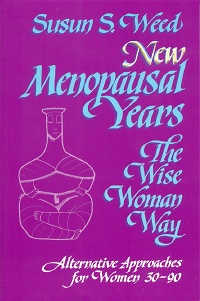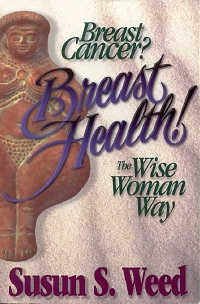Hi Susun,
I’m confused about mammograms. My gut tells me that they are unnecessary and possibly even cancer-CAUSING. Media tells us that we must get annual mammograms to screen for breast cancer. What’s the answer? I’d love to know your approach. Thanks.
Susun Weed’s response:
From my book Breast Cancer? Breast Health! The Wise Woman Way, chapter 5:
Perhaps no aspect of breast cancer is more widely publicized than screening mammography. Ads on television, in magazines, and in the daily paper urge women to deal with fear about breast cancer by having a yearly mammogram. We’re even told that doing this is a way to “really care for yourself.”
But screening mammograms don’t prevent breast cancer. A mammogram is an x-ray and x-rays cause cancer. The ads promoting regular screening mammography are paid for by those who stand to profit from their widespread acceptance and use—the manufacturers of the equipment and x-ray film. Whose health does this technology really benefit? Women’s health? Or corporate health?
Should women have screening mammograms? At what age? How frequently? Science hasn’t agreed on answers to these questions. I believe that my anti-cancer lifestyle will decrease risk of dying from breast cancer in a way that regular mammograms won’t. I care for my breasts with infused herbal oils, regular loving touch, organic foods, and healthy exercise—and I forego regular screening mammograms. Of course, you can do it all in the Wise Woman Tradition. The point is to pay attention to your breasts.
If you decide to have a mammogram, here is some advice on how to protect yourself and get the most out of it:
If You Decide to Have a Mammogram
• Get the best, even if it means a long journey.
• Go where they specialize, preferably where they do at least 20 mammograms a day.
• Be sure the facility is accredited by the American College of Radiology.
• Insist on personnel who specialize in mammograms. (Taking and reading mammograms are skills that require intensive training and a lot of practice.)
• Ask how old the equipment is. Newer equipment exposes the breasts to less radiation. A dedicated unit (one specifically for mammograms) is best.
• Ask how they ensure quality control. When was their unit calibrated?
• Load your blood with carotenes by eating a cup of cooked sweet potato, winter squash, or carrots every day for a week before the mammogram to prevent radiation damage to your DNA.
• Expect to be cold and uncomfortable during the mammogram, but do say something if you’re being hurt.
• The more compressed the breast tissue, the clearer the mammogram. (But pressure may spread cancer cells if they’re present.)
• If your breasts are tender, reschedule. During your fertile years, schedule mammograms for 7–10 days after your menstrual flow begins.
• Don’t wear antiperspirant containing aluminum; it can interfere with the imaging process. (Those clear stones do contain aluminum, as do most commercial antiperspirants.)
• If you want another opinion, you’ll need the original mammographic films, not copies. (X-ray facilities only keep films for 7 years.)
• Get your doctor to agree, in writing, before the procedure, to give you a copy of your mammogram. The U.S. Public Health Service advises women to ask for written results from a mammogram.
• Given the high percentage of “false normal” mammograms, if you think you have cancer, trust your intuition.
• Remove radioactive isotopes from your body with burdock root, seaweed, or miso.
Remember: Mammograms don’t promote breast health. Breast self-massage, breast self-exam, and lifestyle changes do.
Green blessings, Susun Weed
photos: Wise Woman Spiral © iStockphoto.com / Chuck Spidell | Pangaia Cover © 2003 Suzanne Cheryl Gardner












0 Comments